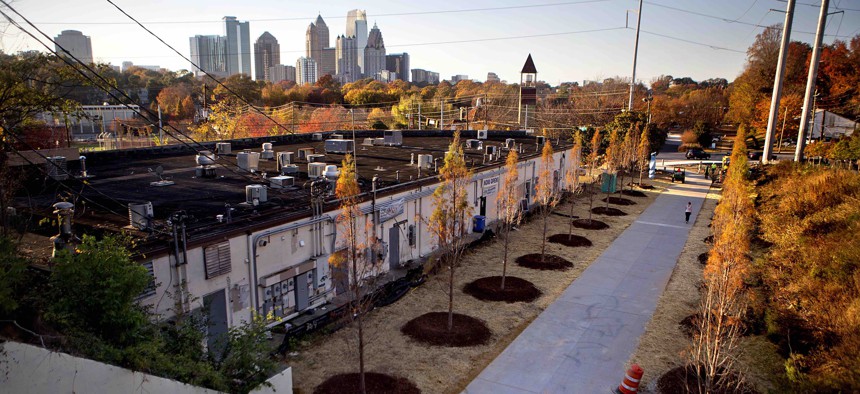Lawmakers Push to Make Tax Credit Targeting Poor Areas Permanent

(AP Photo/David Goldman, File) The New Markets Tax Credit program is meant to help attract capital to areas that could use an economic boost.

Connecting state and local government leaders
Two House members are advocating for the New Markets Tax Credit program to be extended in any post-election tax legislation.
A bipartisan duo of House lawmakers is trying to build support for permanently reauthorizing a soon-to-expire tax credit meant to draw investment to low-income communities.
Reps. Steve Stivers, an Ohio Republican, and José Serrano, a New York Democrat, are seeking colleagues to sign a letter urging Ways and Means Chairman Kevin Brady, Republican of Texas, to include a permanent extension of the New Markets Tax Credit program in any tax legislation House lawmakers consider during the “lame duck” session after the November elections.
The program dates back to 2000. It was last reauthorized by 2015 legislation that extended it through the end of 2019, with up to $3.5 billion of credits allotted annually in recent years.
Treasury Department figures show total credit awards of $54 billion from 2001 to 2017.
New Markets tax credits provide a way for large institutional investors to get tax breaks in exchange for funneling investment dollars towards projects in economically distressed areas.
In the letter they’re circulating, Stivers and Serrano suggest that the reauthorization legislation should be along the lines of a bill that has been introduced in both the House and Senate that’s known as The New Markets Tax Credit Extension Act.
Reps. Tom Reed, a New York Republican and Richard Neal, a Massachusetts Democrat, are the lead sponsors on the House version. It has 99 other cosponsors, 54 of them Democrats and 45 Republicans.
Sen. Roy Blunt, a Missouri Republican, is the lead sponsor on the Senate legislation, which is also backed by 11 Democratic and nine GOP co-sponsors.
House Speaker Paul Ryan voiced interest earlier this year in potentially advancing legislation after the election to make “technical corrections” to the massive tax code overhaul President Trump signed into law last year. It's possible that lawmakers could also tackle a “tax extenders” package, renewing temporary tax breaks that are expiring.
Bob Rapoza, a spokesman for the New Markets Tax Credit Coalition, says those potential legislative efforts could provide an opening to reauthorize the New Markets program.
“We are taking a serious run at it,” he said.
Rapoza also explained that the pending legislation to extend the program would authorize roughly $5 billion of credit allocations annually, with future inflation adjustments.
Under the tax credit program, the Treasury Department allocates tax credit authority to groups called “community development entities,” or CDEs, which are supposed to have a primary mission of serving or providing investment capital for low-income communities.
Investors that contribute money to CDEs can gain access to New Markets tax credits in return, which lower their tax obligations. Organizations that form a CDE might include banks, nonprofits, or cities. Investors looking for the credits are commonly major banks.
In July, Reps. Jason Smith, a Missouri Republican, and Terri Sewell, an Alabama Democrat, introduced a bill to provide $500 million in annual credits during 2018 and 2019 specifically targeting rural areas.
The New Markets program has helped to finance nearly 5,000 projects around the U.S. between 2000 and 2015, according to the New Markets Tax Credit Coalition. These projects have included facilities like health clinics, schools, office space, grocery stores and manufacturing.
A 2013 evaluation by the Urban Institute found “the most prevalent results" of the credit program, at least in the program's earlier years, included advantageous financing, real estate development in low-income areas, strengthened local tax bases and job creation.
Bill Lucia is a Senior Reporter for Government Executive's Route Fifty and is based in Washington, D.C.

NEXT STORY: Soda Makers, Grocers Dump Millions Into Anti-Tax Ballot Initiatives





